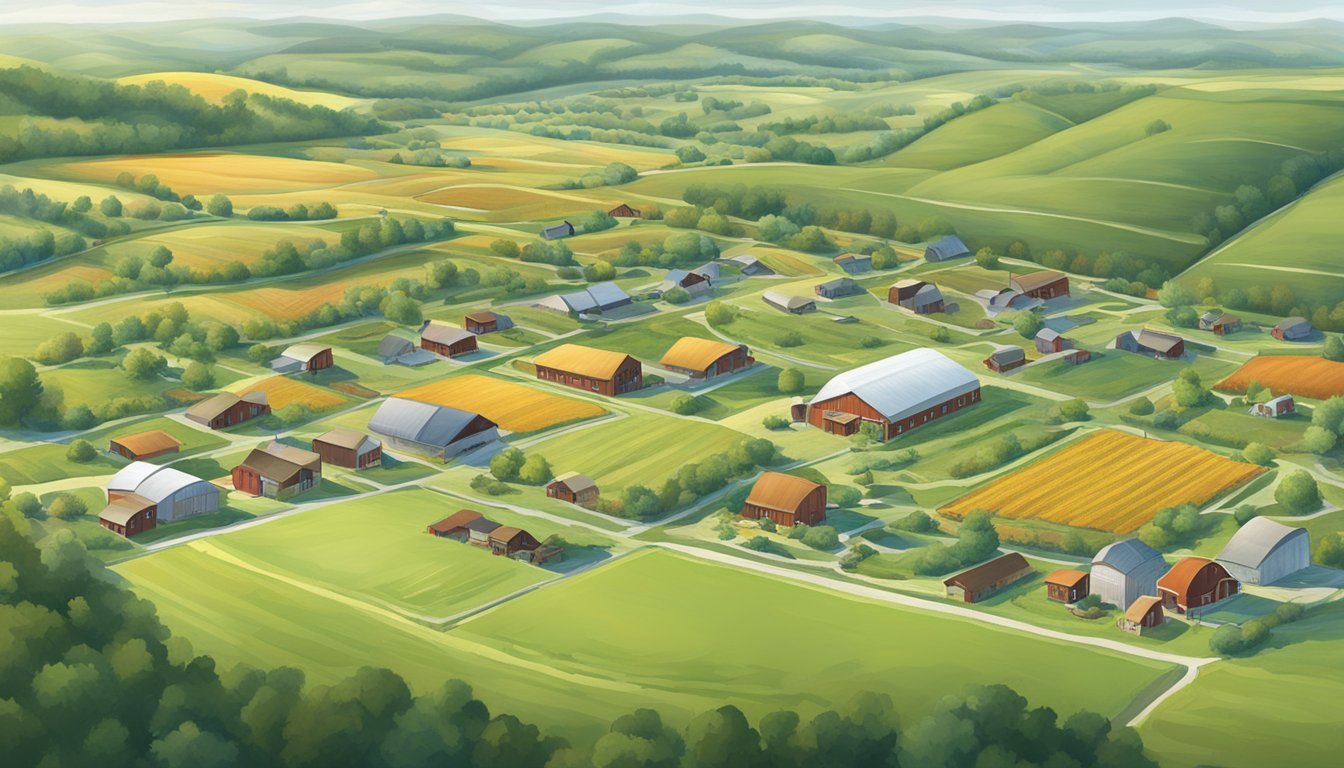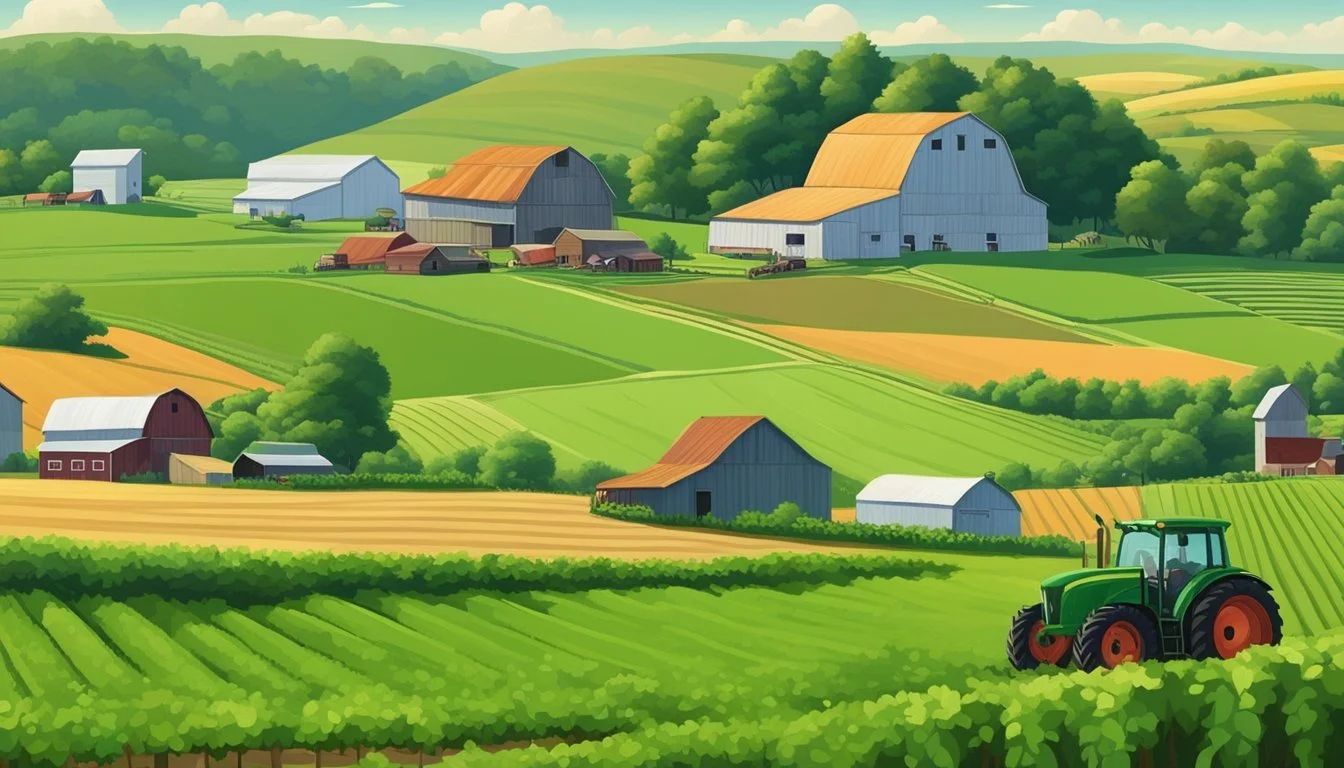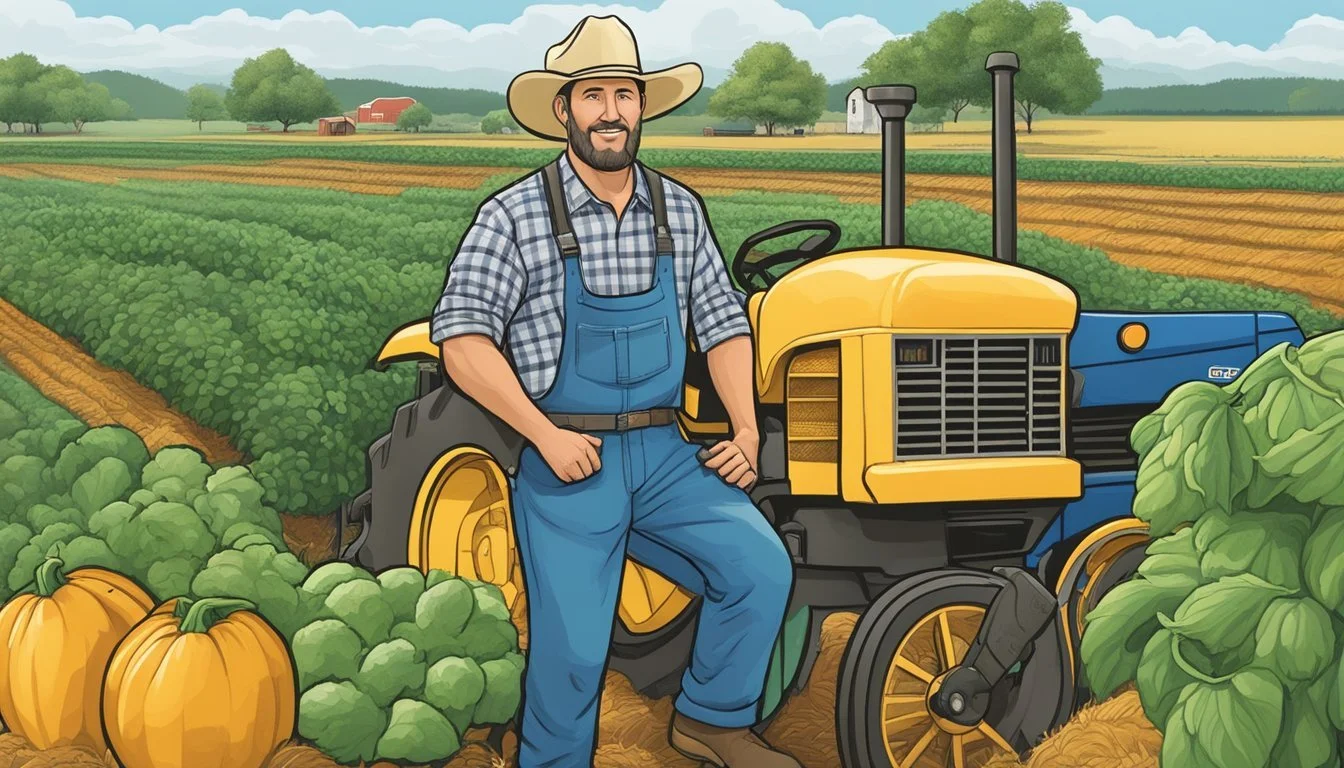Farming Communities in Tennessee
Innovations and Challenges
Nestled in the heart of the southeastern United States, Tennessee boasts some of the most scenic and productive farming communities. Known for its rich agricultural heritage, the state's rural areas offer a mosaic of lush landscapes and fertile soil. The combination of natural beauty and agrarian charm makes Tennessee an attractive destination for those seeking a tranquil yet productive farming life.
From the rolling hills of the Smoky Mountains to the fertile plains in the west, Tennessee provides diverse environments for all types of farming. Small farms dot the countryside, offering a glimpse into the state’s strong agricultural traditions. Communities like Tellico Plains and Paris stand out, not only for their picturesque settings but also for their tight-knit and welcoming nature. The positive community spirit and commitment to sustainable farming practices are key drivers for maintaining the agricultural prosperity in these regions.
Whether one is interested in starting a hobby farm, raising livestock, or cultivating crops, Tennessee's farming communities offer ample opportunities. The area's affordability and strategic location make it ideal for those looking to embark on a farming adventure. With an average price per acre that remains competitive, investors and aspiring farmers alike can find their ideal piece of land to call home.
History of Farming in Tennessee
Farming has played a pivotal role in shaping Tennessee’s economy and culture. This section explores the evolution of agriculture and highlights influential figures who have left their mark on the state's agricultural heritage.
The Evolution of Agriculture
Early Tennessee settlers relied on agriculture as their primary means of subsistence and income. Crops such as corn, tobacco, and cotton became staples, driving economic growth and settlement patterns.
In the 19th century, Tennessee saw a shift from subsistence farming to commercial agriculture. The introduction of new agricultural techniques and machinery increased productivity. Key crops like cotton and tobacco became central to the state's economy.
By the 20th century, diversification began to take hold. Farming communities started growing soybeans, and livestock farming gained prominence. Advances in technology and modern farming practices further boosted agricultural efficiency.
Influence of Historical Figures
Several historical figures have significantly impacted Tennessee’s farming legacy. For instance, Andrew Jackson, the 7th President of the United States, was a prominent landowner and agriculturist in Tennessee. His advocacy for agricultural development was notable.
Ina May Gaskin, a pioneer in midwifery, also contributed to the agricultural community through the Farm Midwifery Center, which supports rural healthcare. This initiative has improved living standards in farming communities.
The Tennessee Century Farms Program, established by the Tennessee Department of Agriculture, honors families that have maintained continuous agricultural production for over a hundred years. This program reflects the dedication and perseverance of Tennessee’s farming families.
Current State of Agriculture in Tennessee
Tennessee's agriculture is characterized by a diverse range of farm sizes and types, as well as a wide variety of crops and livestock that contribute significantly to the state's economy.
Family Farms and Large-Scale Operations
In recent years, Tennessee has seen a decline in the number of farms, now totaling 63,105. Family-owned farms represent a significant portion, though there has been a noticeable shift towards larger, commercial operations.
Family farms often focus on sustainable practices and local markets, while large-scale operations benefit from economies of scale. Despite the shrinking number, family farms continue to be pivotal in local communities through direct sales and community-supported agriculture programs.
The Tennessee Department of Agriculture supports both small and large farms through various initiatives and resources aimed at fostering growth and sustainability.
Main Crops and Livestock
Soybeans are Tennessee's top agricultural product by cash receipts, accounting for $1.09 billion annually. Farmers harvested over 1.62 million acres of soybeans, producing more than 77.7 million bushels in 2022.
Cotton and corn also play crucial roles, with an increase expected in 2024. Farmers are planting more soybeans, cotton, and hay, but less corn, wheat, and tobacco this year.
Livestock, including cattle and poultry, is essential too. Beef cattle production is vital, and dairy farming contributes significantly. The USDA continues to provide vital statistics and support for these sectors, ensuring farmers have up-to-date market insights.
University of Tennessee's Role
The University of Tennessee plays a crucial part in supporting farming communities through education, research, and community engagement.
Agricultural Education and Research
The University of Tennessee Institute of Agriculture (UTIA) specializes in providing cutting-edge education and conducting vital research. UTIA houses various programs that focus on agricultural sciences, offering degrees that prepare students for a range of careers in the agricultural sector.
Research at UTIA addresses key agricultural challenges. Scientists work on projects related to crop improvement, pest management, and sustainable farming practices. The AgResearch Centers are scattered across the state, providing valuable findings that directly benefit local farmers.
These efforts help improve crop yields, reduce environmental impact, and enhance the economic viability of farming in Tennessee.
Extension Services and Community Engagement
UT Extension extends the university's resources to every county in Tennessee, providing critical support and guidance to farmers. With 95 county Extension offices, the program ensures that up-to-date agricultural practices and knowledge are accessible statewide.
Extension agents collaborate with farmers to implement best practices, improve farm management, and tackle issues such as disease control and market access. The Extension program also offers workshops, one-on-one consultations, and educational materials.
Local communities benefit from these services as they help increase productivity, promote sustainability, and drive economic growth in rural areas. This close partnership between the university and farming communities fosters resilience and innovation in Tennessee's agricultural sector.
Economic Impact of Farming
Farming in Tennessee significantly influences the state's economy and serves as a vital source of employment for many communities, particularly in rural areas.
Contribution to the State's Economy
Agriculture remains a cornerstone of Tennessee's economic structure. It generated around $5.3 billion in agricultural cash receipts in 2022, with soybeans, broilers, and cattle and calves being the highest-valued commodities. The substantial economic effects extend beyond direct sales.
Agricultural activities also create ripple effects benefiting multiple sectors.
For instance, the Tennessee Agricultural Enhancement Program (TAEP) supports long-term investments on farms, further bolstering the local economy.
Moreover, agriculture and forestry together make up $81.8 billion of the state’s economic activity, emphasizing the critical role these sectors play in Tennessee’s financial health.
Farming as a Source of Employment
Farming provides considerable employment opportunities within Tennessee. In many rural counties, agriculture represents a primary job source, employing thousands. A specific example noted employment of 2,037 workers in one county's agriculture sector.
Additionally, the job multiplier effect means more jobs are indirectly created in related industries such as food processing, equipment manufacturing, and logistics.
Workers in agriculture often receive varying compensation, influenced by factors like job type and demand for labor. Investments in agricultural programs ensure sustainable employment, reinforcing its importance to the state's broader community.
Conservation and Environmental Practices
The farming communities in Tennessee prioritize sustainable practices and biodiversity preservation to ensure long-term agricultural viability and ecosystem health.
Sustainable Practices and Stewardship
Farmers in Tennessee are increasingly adopting sustainable agriculture methods to mitigate environmental impact. Practices such as crop rotation, cover cropping, and reduced tillage help improve soil health and minimize erosion.
The University of Tennessee Institute of Agriculture has been a leader in no-till farming, an approach that reduces soil disturbance and increases organic matter in fields. Their Milan No-Till Field Day showcases these techniques, providing education and demonstrations to farmers statewide.
The Natural Resources Conservation Service (NRCS) plays a pivotal role by offering technical assistance. This includes resource assessment, practice design, and resource monitoring, ensuring that landowners manage their farmland effectively and sustainably.
Wildlife Preservation and Biodiversity
Tennessee farmers are also dedicated to preserving local wildlife and biodiversity. Efforts include maintaining habitats for native species and integrating practices that support ecological balance.
Programs funded by the Land and Water Conservation Fund have helped protect significant swathes of land, such as the 400,000 acres conserved by The Nature Conservancy. By safeguarding these areas, the state ensures diverse habitats for wildlife and protects ecosystem functions.
Additionally, partnerships between farmers and environmental organizations focus on conservation planning and habitat restoration, fostering an environment where agriculture and wildlife can thrive together. These collaborative efforts demonstrate a commitment to ecological stewardship alongside productive farming.
Farming Communities and Tourism
Farming communities in Tennessee offer a mix of agritourism activities and picturesque rural towns rich in history and charm.
Agritourism and Festivals
Agritourism in Tennessee provides visitors with engaging farm-based activities. They can explore working farms, participate in seasonal activities, and attend farm-to-table events. For instance, there are farms that offer U-pick experiences, allowing families to pick their own fruits and vegetables.
Local festivals are a highlight, celebrating everything from harvests to rural heritage. The variety of events includes corn mazes, hayrides, and pumpkin patches. These activities serve as an excellent way to experience the state's natural beauty and support local farming communities. With each season, new agritourism opportunities arise, attracting visitors year-round.
Historical Towns and Rural Charm
Tennessee’s rural towns, such as Townsend, provide a peaceful retreat from urban life. Townsend, known as the "Peaceful Side of the Smokies," features scenic landscapes and historical allure. Visitors can enjoy the fall foliage, hiking in the Great Smoky Mountains, and exploring local heritage sites.
These towns often preserve their historical architecture and charm, offering a glimpse into the past. Many of these communities host antique shops, local crafts, and historical reenactments. The appeal of these areas lies in their tranquil environment and the strong sense of community, making them ideal for a serene getaway.
Agricultural Programs and Support
Tennessee farming communities benefit from a variety of state and federal programs that enhance agricultural productivity and community development initiatives. These efforts include the Tennessee Agricultural Enhancement Program (TAEP), grants, and various community outreach projects.
State and Federal Support for Farmers
The Tennessee Agricultural Enhancement Program (TAEP), established in 2005, provides significant financial assistance to local farmers. This program aims to boost farm profitability, enhance operational safety, and adapt to changing markets. Since its inception, over $246 million has been invested in more than 80,860 projects.
In addition, federal grants and incentives further support Tennessee farmers. These resources help with disaster relief, environmental conservation, and agricultural research. Programs like the Conservation Reserve Program (CRP) offer monetary benefits for sustainable farming practices.
List of Key Programs:
TAEP: Provides cost-share dollars for long-term farm investments.
CRP: Promotes conservation and environmental health.
Federal Grants: Aid in disaster relief and technological advancements.
Community Outreach and Development
Community development is bolstered by initiatives such as the Tennessee Farm Bureau, which advocates for farmers' interests at both the state and national levels. Through educational programs, networking events, and resource sharing, the Bureau plays a critical role in community well-being.
Moreover, local outreach programs focus on youth involvement in agriculture, ensuring the next generation is well-versed in modern farming practices. Workshops, seminars, and community projects aim to foster a strong, connected farming community.
Important Community Initiatives:
Educational Workshops: Teach sustainable farming practices.
Youth Programs: Engage the younger generation in agriculture.
Resource Sharing: Enhance community knowledge and collaboration.
Challenges Faced by Tennessee Farmers
Farmers in Tennessee encounter numerous obstacles, impacting their productivity and livelihoods. These challenges are multifaceted, including economic pressures and environmental changes driven by climate variability.
Market Fluctuations and Economic Pressures
The agricultural market is highly volatile, affecting Tennessee farmers significantly. Prices for crops and livestock can fluctuate drastically due to factors like changes in supply and demand, international trade policies, and economic downturns.
Farmers in Tennessee often find themselves squeezed by rising costs of inputs such as seeds, fertilizers, and machinery. This economic pressure compels them to make tough decisions on resource allocation and risk management.
Additionally, labor costs and availability pose significant issues. With an aging workforce and a lack of younger workers entering farming, labor shortages exacerbate these economic pressures. Farmers struggle to maintain their operations without a stable, affordable labor force.
Environmental Challenges and Climate Change
Tennessee's climate presents its own set of challenges, affecting both crop yield and livestock health. Extreme weather conditions, such as prolonged droughts and heavy rainfall, disrupt the growing seasons and damage crops.
Climate change intensifies these weather patterns, making it increasingly difficult for farmers to predict and plan their agricultural activities. Rising temperatures also contribute to the proliferation of pests and diseases, requiring more intensive and costly pest management strategies.
Soil quality and water availability are additional concerns. Overuse and mismanagement of resources deplete the soil's fertility and degrade its condition, while changing precipitation patterns affect water supplies necessary for irrigation. Farmers must adopt sustainable practices to combat these environmental threats effectively.
Future of Farming in Tennessee
Tennessee's farming future hinges on leveraging technological advancements and understanding local market dynamics within the global agricultural landscape. These elements will shape sustainable food systems and ensure the growth of farming communities.
Technological Advancements in Agriculture
Innovations in agriculture are transforming farming in Tennessee. Precision farming technologies, which include GPS mapping and soil sensors, allow farmers to optimize crop yields while minimizing resource use.
Automation is also proving valuable. Drones and autonomous tractors are becoming common, helping farmers monitor crops and manage labor more efficiently. New breeding techniques and genetically modified crops promise to increase resilience against pests and diseases.
State-sponsored initiatives like the Tennessee Urban Farm and Forestry (TUFF) cost-share program are accelerating adoption in urban areas, ensuring that even marginalized communities benefit from these advancements.
The Role of Local Markets and Global Trends
The interplay between local markets and global trends critically affects Tennessee’s agricultural future. Farmers Markets are central in this scenario, offering fresh, local products and fostering direct relationships between farmers and consumers.
On a global scale, changing trade policies and climate conditions are influencing agricultural practices. Tennessee's farmers must adapt to meet both local demands and export opportunities while staying aware of global shifts in food production and consumption patterns.
Additionally, innovations in logistics and cold-chain storage are crucial. These advancements help maintain the quality of Tennessee's agricultural products, allowing them to compete in both domestic and global markets.








